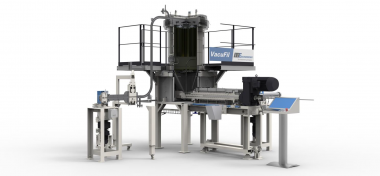BB Engineering: Visco+ innovative vacuum filter for IV setting
Under vacuum, the new BB Engineering large-area filter produces a homogeneous, pure melt with a targeted IV setting for instance, for returning polyester production waste to the melt flow, but also for achieving a homogeneous viscosity in the case of virgin material.
BB Engineering has expanded its melt filter portfolio to include a patented large-area vacuum filter designed especially for processing polyester waste. The so-called Visco+ filter is already known as the key component of the BB Engineering VacuFil recycling system. Now, it is also available as a separate and easily-integratable upgrade component for existing systems. Within this context, the uses of the Visco+ are by no means limited to just decontamination. Here, the Visco+ offers the following solutions:
- IV homogenization: if an existing production system is struggling with IV fluctuations, the Visco+ is able to actively intervene and balance out any irregularities;
- IV increase: if the final viscosity is insufficient when processing recycled materials, the Visco+ can increase the IV without the negative impact of long residence times.
In this way, the Visco+ enables fast and flexibly-controllable viscosity build-up and reliable viscosity monitoring of the polyester melt using a to-date unique, patented process. Depending on the intended end use, the melt can be ad-justed to the further processing procedure in a targeted manner. The requi-site melt properties above all the intrinsic viscosity, but also the purity and homogeneity are achieved in a reliable and reproducible manner and can also be adjusted during ongoing operation.
As a melt filter, the Visco+ operates like a liquid-state polycondensation unit. A maintenance-intensive reactor or a deposit-prone stirring unit are not required. Moisture is removed from the PET in the filter, which – in conjunction with an adjustable residence time – results in the desired IV increase in the vacuum. This enables a controlled IV build-up of up to 30%. The intrinsic vis-cosity is the central quality figure in PET recycling and rPET processing. It determines the melt performance in the downstream production process and the properties of the end products. The intrinsic viscosity is continually moni-tored by means of an integrated viscosity measurement unit and reliably adjusted in the event of deviations (caused by disparate input qualities, for ex-ample). At the same time, the filter provides an enormous material surface compared to the volume and continuously renews this. To this end, contamination can be removed particularly effectively from the starting material by means of automatically-regulated high-performance vacuum (1-30 mbar).
The Visco+ is particularly suitable for recycling PET waste that is to be reused for high-end products.
BB Engineering








